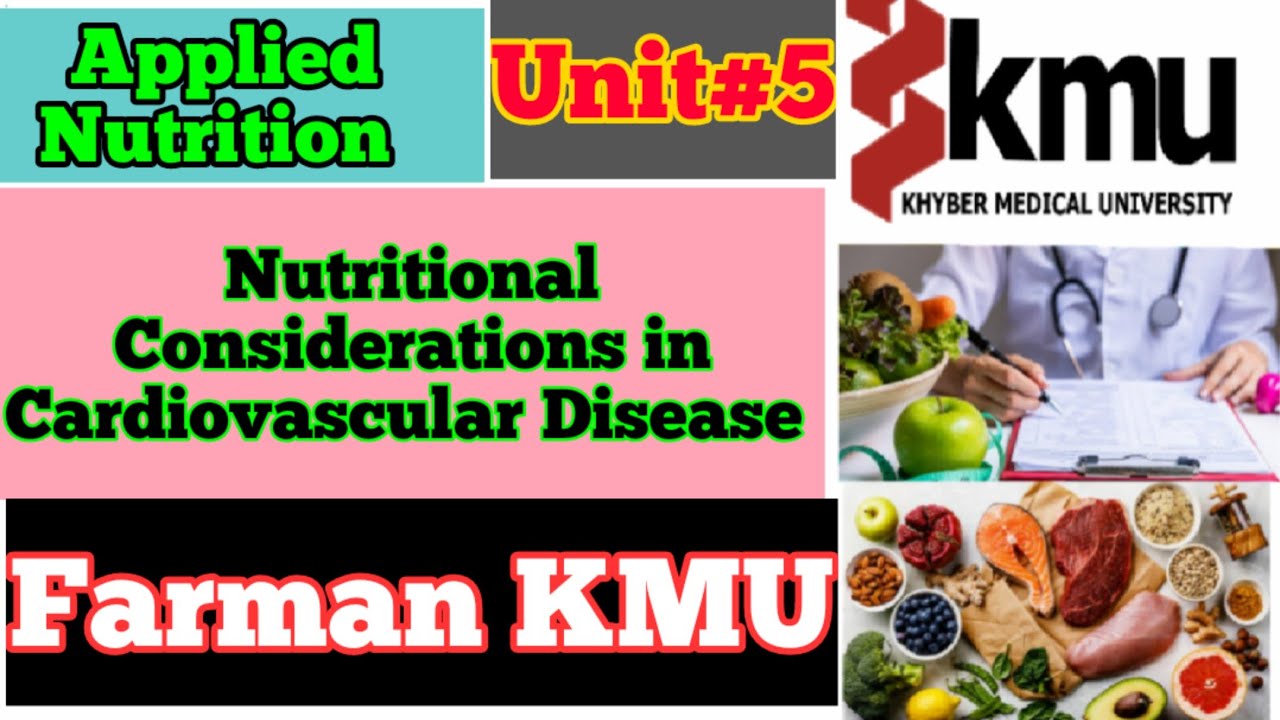Understanding The Connection Between Nutrition And Cardiovascular Health - A Comprehensive Review
Understanding the connection between nutrition and cardiovascular health is essential for promoting heart health and preventing heart disease. The heart is one of the most vital organs in the human body, and maintaining its health is crucial for overall well-being. Diet is a significant factor in heart health, and the foods we eat can either promote or detract from cardiovascular health.
Author:Suleman ShahReviewer:Han JuMar 14, 2023123.5K Shares1.9M Views

Understanding the connection between nutrition and cardiovascular healthis essential for promoting heart healthand preventing heart disease. The heart is one of the most vital organs in the human body, and maintaining its health is crucial for overall well-being. Diet is a significant factor in heart health, and the foods we eat can either promote or detract from cardiovascular health.
There is a growing body of research highlighting the connection between nutrition and cardiovascular health, and understanding this connection can help individuals make informed decisions about their diet and lifestyle. This article will explore Understanding the connection between nutrition and cardiovascular health, examining the impact of different nutrients on heart health, and offering tips for promoting heart health through diet.
What Is Cardiovascular Disease?
Cardiovascular disease(CVD) is a term used to describe a group of conditions that affect the heart and blood vessels. These conditions can include coronary artery disease, heart failure, stroke, and peripheral artery disease. Understanding the connection between nutrition and cardiovascular health is important to prevent heart disease.
CVD is a leading cause of death globally, and it is often caused by a combination of genetic and lifestyle factors such as high blood pressure, high cholesterol levels, smoking, physical inactivity, and poor nutrition. CVD can result in serious health complications, including heart attacks and strokes, which can lead to disability, reduced quality of life, and even death.
Early detection and management of risk factors for CVD, including a healthy diet, regular exercise, and medication, can help prevent or delay the onset of CVD and improve cardiovascular health.
What Is A Balanced Diet?
A balanced diet is a diet that contains all the essential nutrients in the right amounts to maintain good health. A balanced diet includes a variety of foods from all food groups, including fruits, vegetables, whole grains, lean protein, and healthy fats.
Fruits And Vegetables
Fruits and vegetables are rich in vitamins, minerals, and fiber, which are essential for cardiovascular health. Studies have shown that a diet rich in fruits and vegetables can help reduce the risk of developing CVDs. Fruits and vegetables are also low in calories, which can help maintain a healthy weight.
Whole Grains
Whole grains are rich in fiber, which can help reduce the risk of developing CVDs. Whole grains also contain vitamins and minerals, which are essential for cardiovascular health. Examples of whole grains include brown rice, whole wheat bread, and oatmeal.
Lean Protein
Lean protein sources, such as chicken, fish, and legumes, are an essential part of a balanced diet. These protein sources are low in saturated fat, which can help maintain healthy cholesterol levels. Red meat and processed meats, on the other hand, are high in saturated fat, which can increase the risk of developing CVD.
Healthy Fats
Healthy fats, such as monounsaturated and polyunsaturated fats, can help reduce the risk of developing CVD. These fats are found in foods such as nuts, seeds, avocados, and fatty fish. Saturated and trans fats, on the other hand, can increase the risk of developing CVDs and should be limited in the diet.
Importance Of Understanding The Connection Between Nutrition And Cardiovascular Health
The importance of understanding the connection between nutrition and cardiovascular health lies in the fact that the heart is a vital organ responsible for pumping blood and oxygen to the rest of the body.
Poor nutrition and an unhealthy diet can lead to the accumulation of cholesterol and other substances in the arteries, leading to the development of cardiovascular diseases such as hypertension, atherosclerosis, and heart attacks.
Conversely, a healthy diet that is rich in nutrients, such as whole grains, fruits, and vegetables, can help maintain cardiovascular health by reducing the risk of developing heart disease. Therefore, understanding the role of nutrition in cardiovascular health can empower individuals to make informed choices about their diet and lifestyle, leading to a healthier heart and a healthier life.
Several nutrients found in food can help reduce the risk of developing CVDs. These nutrients include
Omega-3 Fatty Acids
Omega-3 fatty acids are a type of healthy fat that can be found in fatty fish, such as salmon, mackerel, and tuna. Omega-3 fatty acids can help reduce inflammationin the body, which can contribute to the development of CVDs. Studies have shown that consuming omega-3 fatty acids can help reduce the risk of developing CAD, heart failure, and stroke.
Fiber
Fiber is an essential nutrient that can be found in whole grains, fruits, vegetables, and legumes. Fiber can help reduce the risk of developing CVDs by lowering cholesterol levels, improving blood sugar control, and reducing inflammation. Studies have shown that consuming a high-fiber diet can help reduce the risk of developing CAD, heart failure, and stroke.
Antioxidants
Antioxidants are substances that can help protect the body from damage caused by free radicals. Free radicals are molecules that can damage cells and contribute to the development of CVDs. Antioxidants can be found in fruits, vegetables, and whole grains. Examples of antioxidants include vitamins A, C, and E, and selenium.
Sodium
Sodium is an essential nutrient that is required for the body to function properly. However, consuming too much sodium can increase blood pressure, which is a risk factor for developing CVDs. The American Heart Association recommends that adults consume less than 2,300 milligrams of sodium per day.
Sugar
Consuming too much sugar can increase the risk of developing CVDs. A diet high in sugar can contribute to the development of obesity, which is a risk factor for CVDs. Sugar can also increase inflammation in the body, which can contribute to the development of CVDs.
The American Heart Association recommends that adults limit their intake of added sugars to less than 25 grams per day for women and less than 36 grams per day for men.
Trans Fats
Trans fats are a type of unhealthy fat that can be found in processed foods, such as fried foods, baked goods, and snack foods. Consuming trans fats can increase LDL (bad) cholesterol levels, which is a risk factor for developing CVDs. The American Heart Association recommends that adults consume as little trans fat as possible.

Nutritional Consideration In Cardiovascular Disease | Applied Nutrition Unit #5 | KMU BSN By Farman.
Nutritional Recommendations For Cardiovascular Disease Prevention
To prevent cardiovascular disease, it is recommended to follow a balanced diet that is low in saturated and trans fats, sodium, and added sugars. Instead, focus on consuming whole grains, fruits, vegetables, legumes, lean protein, and healthy fats such as those found in nuts, seeds, and fatty fish.
Aim for at least five servings of fruits and vegetables per day, and limit your intake of processed foods. Additionally, staying hydrated by drinking water and avoiding sugary beverages is important for overall cardiovascular health. It is also recommended to limit alcohol consumption and maintain a healthy weight through regular exercise and physical activity.
By following these nutritional recommendations, you can reduce your risk of developing cardiovascular disease and improve your overall health.
People Also Ask
What Is The Role Of Fiber In Cardiovascular Health?
Fiber can help reduce the risk of developing cardiovascular diseases by lowering cholesterol levels, improving blood sugar control, and reducing inflammation.
How Does Consuming Too Much Sodium Increase The Risk Of Developing Cardiovascular Diseases?
Consuming too much sodium can increase blood pressure, which is a risk factor for developing cardiovascular diseases.
What Are Some Examples Of Healthy Fats That Can Promote Cardiovascular Health?
Healthy fats that can promote cardiovascular health include those found in nuts, seeds, and fatty fish.
Why Is Limiting Sugar Intake Important For Cardiovascular Health?
Consuming too much sugar can contribute to the development of obesity, which is a risk factor for cardiovascular diseases.
Conclusion
Understanding the connection between nutrition and cardiovascular health plays a vital role in cardiovascular health. A balanced diet with the right nutrients can help reduce the risk of developing CVD. Fruits, vegetables, whole grains, lean protein, and healthy fats are all important components of a healthy diet.
Consuming too much sodium, sugar, and trans fats can increase the risk of developing CVD. By making simple changes to your diet, such as consuming more fruits and vegetables and limiting your intake of added sugars and unhealthy fats, you can improve your cardiovascular health and reduce the risk of developing CVD.

Suleman Shah
Author
Suleman Shah is a researcher and freelance writer. As a researcher, he has worked with MNS University of Agriculture, Multan (Pakistan) and Texas A & M University (USA). He regularly writes science articles and blogs for science news website immersse.com and open access publishers OA Publishing London and Scientific Times. He loves to keep himself updated on scientific developments and convert these developments into everyday language to update the readers about the developments in the scientific era. His primary research focus is Plant sciences, and he contributed to this field by publishing his research in scientific journals and presenting his work at many Conferences.
Shah graduated from the University of Agriculture Faisalabad (Pakistan) and started his professional carrier with Jaffer Agro Services and later with the Agriculture Department of the Government of Pakistan. His research interest compelled and attracted him to proceed with his carrier in Plant sciences research. So, he started his Ph.D. in Soil Science at MNS University of Agriculture Multan (Pakistan). Later, he started working as a visiting scholar with Texas A&M University (USA).
Shah’s experience with big Open Excess publishers like Springers, Frontiers, MDPI, etc., testified to his belief in Open Access as a barrier-removing mechanism between researchers and the readers of their research. Shah believes that Open Access is revolutionizing the publication process and benefitting research in all fields.

Han Ju
Reviewer
Hello! I'm Han Ju, the heart behind World Wide Journals. My life is a unique tapestry woven from the threads of news, spirituality, and science, enriched by melodies from my guitar. Raised amidst tales of the ancient and the arcane, I developed a keen eye for the stories that truly matter. Through my work, I seek to bridge the seen with the unseen, marrying the rigor of science with the depth of spirituality.
Each article at World Wide Journals is a piece of this ongoing quest, blending analysis with personal reflection. Whether exploring quantum frontiers or strumming chords under the stars, my aim is to inspire and provoke thought, inviting you into a world where every discovery is a note in the grand symphony of existence.
Welcome aboard this journey of insight and exploration, where curiosity leads and music guides.
Latest Articles
Popular Articles
